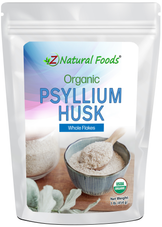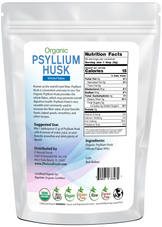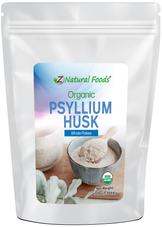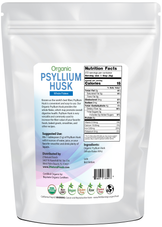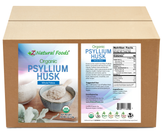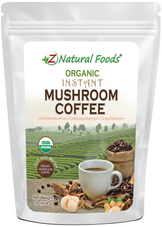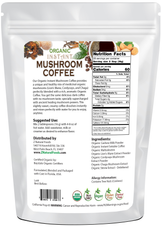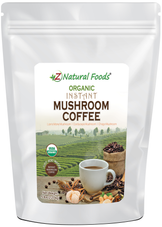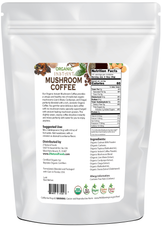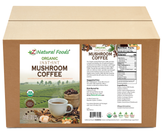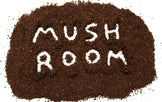Description
Description
Psyllium is a soluble fiber made from the husks of the Plantago ovata shrub.
Psyllium is commonly used for its natural plant-based fiber properties to relieve constipation and mild diarrhea.
It’s a bulk-forming laxative that soaks up water in your gut to make bowel movements easier [1].
That being the case, psyllium is often the main ingredient in fiber supplements that support digestion health and reduces constipation.
Psyllium is found in whole husk or powder form. Psyllium powder is made from grinding down psyllium husks into fine dust. This powder instantly dissolves in liquid, reducing the fiber's benefits, while the whole husk absorbs water and expands up to 10x, providing more of the fiber’s benefit.
When mixed with fluids, the husks swell into a gel-like bulk and have a slightly grainier texture than the powder.
Both psyllium forms contain negligible protein and only trace essential vitamins and minerals. However, the powder provides twice the amount per tablespoon when it comes to dietary fiber. A 1-tablespoon serving of psyllium powder provides 7 grams of fiber, while the same amount of psyllium husks provides 3.5 grams of fiber [2].
Because it absorbs moisture and swells, taking psyllium can increase the sense of fullness and slow down digestion. As a result, you’ll consume fewer calories and have fewer blood sugar spikes [2].
Psyllium husk: Common Questions and Answers
Is it OK to take psyllium husk every day?
Yes, psyllium is generally safe for daily use. However, psyllium is considered a gentle laxative, and as such, it's best to consume it in moderation.
That said, it’s advisable to speak to your doctor before consuming psyllium for more than a week. Because it aids bowel function and eases constipation, it may mask a less-obvious problem that would benefit from a doctor’s attention. But if you’re taking psyllium to reach your recommended daily fiber intake, then the product is generally safe for long-term consumption [3, 4].
What does psyllium husk do to your body?
Rich in soluble fiber, psyllium is a bulk-forming laxative that can assist with a range of health issues. The supplement soaks up water in your gut, making bowel movements easier and more regular without increasing flatulence. And by slowing digestion and transit time, psyllium gives the large intestines a chance to absorb additional water [2].
Does psyllium husk cleanse your colon?
Another benefit of adding psyllium to your diet is that it binds indigestible food together, easing various digestion problems. In this way, psyllium acts as a colon cleanser in that it gets rid of the excess waste that can build up and cause complications [3].
Unlike other colonic treatments, proper use of psyllium does not alter your electrolyte balance or result in bacterial imbalance. On the contrary, psyllium alters the colonic environment favorably by promoting the balanced growth of healthy bacteria.
Is psyllium husk good for gut bacteria?
A healthy colony of good bacteria in the gut is essential for healthy brain and immune system function. Psyllium is also considered a prebiotic as it promotes a healthy environment for probiotics to grow in the gut [4]. The dietary supplement is particularly beneficial for the guts of chronically constipated individuals.
Because of its effects on the gut microbiome, taking psyllium can boost immune function, reduce inflammation and help your body maintain healthy tissues and cells.
Does psyllium husk affect vitamin absorption?
Taking psyllium means you may have trouble absorbing all the fat in your diet, resulting in issues absorbing fat-soluble vitamins like vitamins A, D, E, and K. Moreover, psyllium might interfere with the absorption of some minerals such as iron, calcium, and zinc [5].
This is why it is suggested that you follow the directions for taking psyllium, drink plenty of fluids and take psyllium husk at least 1 hour before or 2 to 4 hours after eating meals and or taking your vitamins to allow your body enough time to absorb the nutrition [2].
How does psyllium support weight loss?
Many customers use our psyllium husk to relieve constipation, diarrhea, and other digestion issues. Some choose psyllium because the fiber helps slow the food absorption process, thereby improving the glycemic response and possibly supporting weight loss.
Additionally, similar to weight loss aids such as Xenical and orlistat, and because psyllium may reduce fat absorption in some cases, it's possible psyllium may support a calorie reduction plan and may aid in weight loss.
What is the best time to take psyllium husk?
You can take psyllium first thing in the morning or before bedtime. It’s a gentle laxative that does not interfere with your day but makes your digestive system more efficient at expelling waste [2].
As a rule, however, you should not take psyllium supplements simultaneously as other supplements. If a health care provider has recommended psyllium consumption to treat certain conditions, it's best to follow their overall directions.
How long does psyllium husk take to work?
In people with constipation, psyllium usually produces a bowel movement within 12 to 72 hours. You can use the supplement regularly to get the most benefit from it and to make your bowel movements more regular. It may take a few days before you feel the full benefits of psyllium husk [5].
You should speak with your doctor should you feel your symptoms have not improved after several days.
Can you take psyllium husk on an empty stomach?
Because psyllium slows down digestion, it’s important to consume it with food rather than on its own. This way, it will positively affect your blood sugar levels. What's more, fiber, by its very nature, isn't digested by the body; it only aids digestion. Psyllium husk is best taken after meals and not on an empty stomach [5].
How much psyllium should you take daily?
Whether in husk or powder form, Psyllium can be taken as a supplement. The recommended daily serving of psyllium is ½ to 2 teaspoons of psyllium mixed with 8 ounces of water. If you’re on medication, talk to your doctor about the proper dose and other aspects of safe use.
You can also add psyllium husk or powder to juices and smoothies or add it to soups and stews as a natural thickener. It's an incredibly versatile supplement as you can add it to your baking recipes, mix it in with cereal or use it in place of flour or breadcrumbs.
When you first start taking psyllium, it's recommended to start with the smallest amount to allow your digestive system to adjust accordingly and reduce side effects like gas and bloating. You can then gradually increase intake to 2 teaspoons as you see fit. Make sure to increase your water intake when you start taking psyllium to avoid constipation issues.
Can psyllium be taken long-term?
Psyllium is considered safe for long-term use because fiber is not absorbed by the body but passes through the digestive system. For this reason, psyllium is one of the safest long-term treatments for constipation.
Babies, toddlers, and young children should not take psyllium. The dietary supplement is also not recommended for persons with kidney disease, swallowing problems, esophageal narrowing, or any kind of gastrointestinal issues because of its moisture-absorbing capabilities. If you do not have any of these conditions, psyllium is generally safe for consumption in the long term [5].
Remember, psyllium can interact with some medications, so it’s important to consult with your doctor before taking the dietary supplement.
References
- Singh, Baljit. "Psyllium as therapeutic and drug delivery agent." International journal of pharmaceutics 334.1-2 (2007): 1-14.
- Brum, Jose M., et al. "Satiety effects of psyllium in healthy volunteers." Appetite 105 (2016): 27-36.
- Ashraf, W., et al. "Effects of psyllium therapy on stool characteristics, colon transit and anorectal function in chronic idiopathic constipation." Alimentary pharmacology & therapeutics 9.6 (1995): 639-647.
- Wärnberg, Julia, et al. "Functional benefits of psyllium fiber supplementation." (2009).
- McRorie Jr, Johnson W., et al. "Psyllium: The Gel-Forming Nonfermented Isolated Fiber That Delivers Multiple Fiber-Related Health Benefits." Nutrition Today 56.4 (2021): 169-182.


